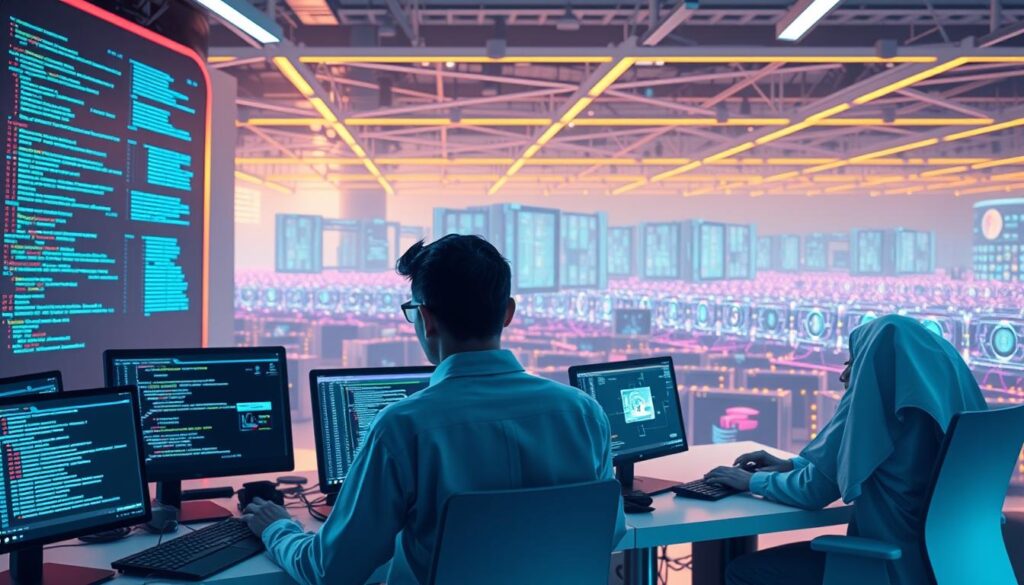
#image_title
We’re seeing a big change in how software is made, thanks to AI. This change is making it faster for developers to finish projects1. AI is now helping with tasks like writing code and finding bugs, making it easier for developers to solve tough problems. Even those who aren’t coders can now make big apps with ease.
AI is making software development better by making it more efficient and accurate1. It’s becoming a key part of how we make software today. Companies using AI see fewer mistakes, up to 25% less1. We’ll look at how AI tools like GitHub Copilot are changing the game, helping developers focus on the hard stuff.
Key Takeaways
- AI-augmented development is expected to boost software development efficiency, allowing developers to complete projects faster1.
- AI tools can automate routine tasks such as code generation and bug fixing, significantly reducing the development cycle time1.
- Companies utilizing AI in development report a decrease in error rates of up to 25%1.
- AI-driven tools enhance code review and bug detection processes, improving efficiency and identifying issues in real-time2.
- Popular AI tools for developers include GitHub Copilot, Google’s Duet AI, Tabnine, Amazon CodeWhisperer, and Google Cloud AI Platform, indicating widespread adoption in the industry2.
- AI-augmented development significantly accelerates development cycles by automating routine tasks, leading to quicker turnaround times from ideation to deployment2.
- AI algorithms improve code quality by analyzing large datasets to identify possible errors and vulnerabilities, leading to better software2.
The Revolution of AI-Augmented Development
Exploring AI-augmented development shows how ai in software engineering is changing the game. Machine learning for code lets developers tackle tough problems while AI handles the routine stuff. By 2027, 70% of developers will use AI tools, up from less than 10% today3.
What’s driving ai-powered software creation? It’s the automation of coding, better predictive maintenance, and higher code quality. Tools like GitHub Copilot and Amazon CodeWhisperer are making a big difference, boosting productivity by 25%4. By 2025, AI tools will make development faster and more efficient, automating tedious tasks5.
The perks of AI-augmented development include:
- Improved code quality and fewer errors
- Speedier and more efficient development
- Better predictive analytics and insights
- Cost savings from better quality and efficiency
As the field grows, intelligent coding will be key in shaping software development’s future. AI lets developers concentrate on innovation, leaving mundane tasks to machines. The future of AI-augmented development is thrilling, and it will be fascinating to see its impact3.
How AI is Transforming Traditional Coding Practices
AI is changing how developers work. It brings new tools for ai-assisted programming and software development automation. These changes let developers focus on big tasks and work more efficiently6.
Coding with AI is getting more popular. It makes coding faster and more precise. AI also cuts down the time needed for testing, helping developers make quality software quickly7.
AI helps in many ways. It improves code quality, lowers bugs, and makes teamwork better. AI tools automate simple tasks, letting developers solve complex problems. This way, they can meet user needs better8.
AI is also making software development faster and better. It supports agile and devops practices, leading to quicker releases and happier customers. As AI use grows, software development will keep getting better6.
| Benefits of AI-Assisted Programming | Description |
|---|---|
| Improved Code Quality | AI-powered tools help reduce bugs and improve code accuracy |
| Enhanced Collaboration | AI-assisted programming enables developers to work together more effectively |
| Faster Time-to-Market | AI-driven testing and automation enable faster delivery of software products |
The Rise of Intelligent Code Generation Tools
Developers are changing how they make software with tools like github copilot and openai codex. These tools use natural language programming to offer smart code suggestions. This makes coding faster and more precise9. AI can cut coding time by up to 50%, and AI coding tools have seen $906 million in investment9.
Using these tools brings many benefits. They improve code quality, cut down bugs, and boost productivity. For example, AI can make developers write code 30% faster with its suggestions10. Tools like github copilot also check code against millions of open-source projects, making it better and more consistent11.
Here are some examples of intelligent code generation tools and their features:
- github copilot: provides smart code completion suggestions and integrates with popular editors like Visual Studio Code
- openai codex: bridges human and machine languages, enabling natural language programming and smart code completion
- tabnine: supports a wide range of IDEs and operates in both cloud and offline modes, providing customizable templates for repetitive tasks
As these tools become more common, software development will get better. The AI market for software development is expected to grow by 25% each year. It’s set to reach over $30 billion by 202510. It’s clear these tools are here to make a big impact.
| Tool | Features | Benefits |
|---|---|---|
| github copilot | smart code completion, integration with Visual Studio Code | improved code quality, reduced bugs, enhanced productivity |
| openai codex | natural language programming, smart code completion | bridges human and machine languages, enables efficient development |
| tabnine | supports multiple IDEs, customizable templates | improves code quality, reduces repetitive tasks, enhances developer productivity |
Democratizing Development Through Low-Code and No-Code Platforms
Low-code and no-code platforms are changing software development. They make it easier for people who aren’t tech experts to create apps. These platforms use ai for agile development, allowing apps to be made and used quickly. By 2025, 75% of companies plan to use these platforms to improve their app-making skills12.
These platforms let users make apps without needing to know how to code. They use natural language to code, making it simple to create apps. For example, Microsoft’s Azure ML Designer lets users make Machine Learning pipelines without coding, making development faster13.
The low-code development market is growing fast. It’s expected to grow from $13.2 billion in 2020 to $45.5 billion by 2025. This is a growth rate of about 28.1% per year12. This growth is because more companies want to make apps quickly and stay ahead in a fast-changing market.
Some key benefits of low-code and no-code platforms include:
- They make development faster, with companies seeing a 50% speed boost compared to traditional coding12
- They lower development costs, with 60% of companies saying they save money using these platforms12
- They help IT and business teams work better together, with 45% of IT pros saying these platforms improve teamwork12
As more businesses use low-code and no-code platforms, we’ll see more innovation. With ai for agile development and natural language to code, the future of making software looks very promising13.
AI-Powered Testing and Debugging: A New Era of Quality Assurance
We’re seeing a big change in how we make software, with ai testing and debugging leading the way14. Traditional tools can’t keep up with today’s fast-paced software development14. But ai can, thanks to its ability to adapt quickly14.
Using ai for testing makes things faster and more efficient14. It also means less work for keeping tests up to date as software changes14. Adding ai to devsecops helps make sure software is secure and follows rules from the start.
AI is playing a bigger role in making software, with tools like Functionize and Testim learning from new data15. Tools like Applitools’ Visual AI help fix tests automatically, saving time15. As we look to the future, understanding ai’s role in software development is key.
AI testing brings many benefits, like better accuracy and faster testing14. But we also need to think about how transparent and controlled ai systems are14. By using ai in software development and devsecops, we can make the process better, safer, and more reliable.
The Human Developer in an AI-Augmented World
As AI becomes more common in software development, it’s key to think about the role of human developers. With ai-assisted code analysis and ai for coding best practices, developers can dive into creative and problem-solving tasks. AI could make developers up to 100 times more productive, moving from a “10x developer” to a “100x developer” with AI tools16.
Developers using AI tools see a 70% drop in time to learn new tech17. This means they can quickly adapt to new tech and improve their skills with AI. Teams using AI and experienced developers also see a 55% higher success rate in complex projects17.
AI helps by automating tasks like code generation, debugging, and testing18. This lets developers concentrate on key development tasks. It ensures software meets user needs and business goals. AI in software development is growing, leading to more innovation and efficiency in many fields18.

In summary, human developers are vital in an AI-augmented world. By using ai-assisted code analysis and ai for coding best practices, developers can improve their skills and focus on important tasks. As AI evolves, understanding its benefits and challenges is essential.
| Benefits of AI-Augmented Software Development | Description |
|---|---|
| Improved Productivity | Automation of routine tasks such as code generation, debugging, and testing |
| Enhanced Developer Skills | Focus on strategic aspects of development, such as creativity and problem-solving |
| Increased Efficiency | Reduced time-to-proficiency for new technologies and higher success rate in complex projects |
Integration of DevSecOps with AI Technologies
DevSecOps and AI are becoming more important in software development. AI helps make security better and work more efficiently19. It automates tasks, cuts down on mistakes, and boosts quality. Secure AI coding lets developers write safer code right from the start.
AI helps a lot with DevSecOps by automating checks for compliance and risk. It spots security issues and suggests fixes, lowering the chance of data breaches20. It also makes coding faster by suggesting code and handling routine tasks like autocompletion21.
AI is used in DevSecOps in many ways, such as:
- Automated testing and debugging
- Real-time code quality monitoring
- AI-driven refactoring
- Automated incident response
These advancements make software development more efficient and secure. They are expected to keep playing a big role in DevSecOps’ future19.
Business Impact and Industry Transformation
AI-Augmented Development is changing how businesses work. It makes developers more productive with tools like no-code platforms. This means companies can make apps without needing to know how to code, saving time and money22.
AI is also making industries more agile. It helps companies automate tasks, improve customer service, and stay ahead of the competition23. The benefits of AI-Augmented Development are clear:
- Improved operational efficiency
- Enhanced customer experiences
- Increased innovation and competitiveness
- Reduced costs and improved scalability
Studies show AI will create new jobs and make existing ones better, adding 12 million jobs worldwide24. As we look to the future, focusing on AI for developer productivity and no-code platforms is key. It will help drive digital transformation and keep us competitive.

| Industry | AI Adoption | Benefits |
|---|---|---|
| Healthcare | High | Improved patient outcomes, enhanced diagnosis |
| Finance | Medium | Automated fraud detection, personalized customer experiences |
| Retail | Low | Hyper-personalization, predictive inventory management |
Overcoming Challenges in AI-Assisted Development
Exploring ai-assisted code design brings up challenges. One big one is the need for special skills, which can stop some from using it25. There’s also the worry about bias in ai-assisted development25.
Organizations can use ai in mobile app development to make software workflows better26. This can boost productivity and cut down on bias and errors. Plus, ai-assisted code design helps understand business processes and make smart decisions27.
Benefits of ai-assisted development include better accuracy, more productivity, and a better customer experience26. Yet, it’s key to remember that there are challenges. Organizations must tackle these head-on to fully benefit from ai-assisted code design and workflow streamlining with ai.
In conclusion, ai-assisted development can change software development for the better. But, we must face the challenges it brings. By understanding these and using ai in mobile app development, organizations can overcome them. This way, they can enjoy the advantages of ai-assisted code design and workflow streamlining252627.
Conclusion: Embracing the Future of Software Development
Looking ahead, AI will change software development a lot28. AI tools could cut development time by up to 30% by 202528. Companies using AI see a 40% boost in productivity by automating tasks28.
AI will change how we make software, making it better and faster. We’ll create apps that are more efficient and reliable.
But, moving to AI in development comes with hurdles28. About 70% of developers need training to use AI tools well28. Big IT teams might find it hard to adopt AI because of old systems and slow change29.
We must tackle these issues to make the most of AI in software development28. This way, we can make products with fewer bugs and deliver them faster28.
AI can also make project management cheaper by 35%28. And, using AI can make software 25% better in quality and upkeep28. By embracing AI, we can make our work more efficient and innovative.
30 AI in programming opens up new chances for innovation30. It lets professionals focus on creative work instead of routine tasks30. We’re excited to see how AI will change our industry for the better.
FAQ
What is AI-Augmented Development?
How is AI transforming traditional coding practices?
What are the key intelligent code generation tools shaping the future?
How are low-code and no-code platforms democratizing software development?
What is the role of AI in testing and debugging?
How are human developers adapting to the AI-augmented world?
How is AI integrated with DevSecOps?
What are the business benefits of AI-Augmented Development?
What are the challenges in AI-Assisted Development?
Source Links
- AI-Augmented Development: The Future of Coding
- AI-Augmented Development – Is it advancing the code? | 10xDS
- AI-Augmented Development: Coding’s New Era
- How is AI-augmented Software Development Revolutionizing the Code Craft?
- Maximizing Development Efficiency: Introducing AI-Augmented Development – Stefanini
- AI-Augmented Software Development: Transforming Software Engineering for the Future
- Software 2.1 — AI Is Coding Now: Why Test Mastery Is Your New Job Security
- Transforming Traditional Software Development with AI-Augmented Techniques
- Chief AI Officer Blog – The future of coding is here: How AI is reshaping software development
- AI-Powered Code Generation: Can AI Replace Software Developers?
- The Rise of AI-Powered Code Generation Tools: How Developers are Accelerating Workflow
- Democratizing Development: How Low-Code/No-Code Empowers Everyone
- Democratization of AI and the Rise of Low-Code and No-Code Solutions
- New Frontier of AI Driven Software: A Solutions Engineering Perspective
- AI in Software Development and Testing: Shaping a New Era of Intelligent Collaboration
- AI-Augmented Development: How AI is Shaping the Future of Software Development Teams
- The Future of Development Teams in an AI-Augmented World
- AI-Augmented Development
- Framework for Augmenting AI within DevSecOps Teams
- Generative AI in DevSecOps
- Efficient DevSecOps Workflows with a Little Help from AI
- How Artificial Intelligence Is Transforming Business – businessnewsdaily.com
- How AI is impacting society and shaping the future | Impact of AI on society and business | Lumenalta
- The augmented workforce for an automated, AI-driven world
- Overcoming Challenges in AI Projects in Practice
- Unlocking the Full Potential of AI-Assisted Development | Blog | Digital.ai
- AI Challenges in Software Development: 6 Steps for Easier AI Adoption in Businesses
- The Future of Software Development: AI-Augmented Tools Explained
- The next era of software development: Insights for businesses – The Business News
- The Future Of AI In Software Development – FortySeven







